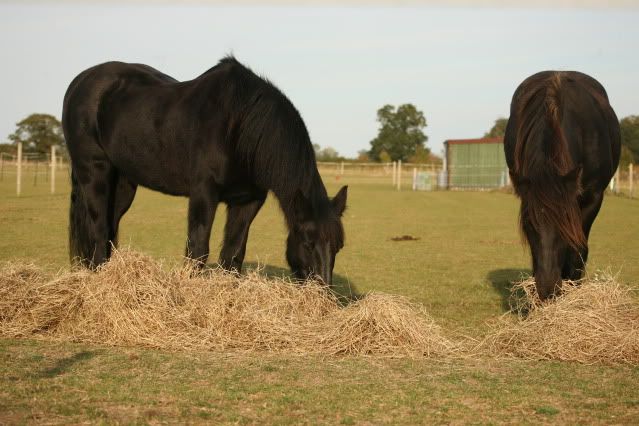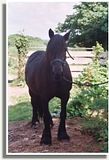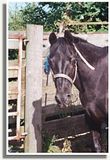Post by zeldalithgow on Jun 28, 2010 21:01:50 GMT -1
I used to feed garlic but read it could make ponies more itchy, and as Prince was a very itchy boy I thought I'd stop the garlic, sure enough he is not nearly as itchy. I didn't know all this abut garlic tho
I saw this on the IHDG board when I was having a browse
Info from Jackie A Taylor
I have repeatedly cautioned against the feeding of garlic since years ago a
supplement manufacturer told me with some glee how it had just been proven
to be a more potent antimicrobial that a prescription drug. I found it was
indeed unsetting my horse's gut back then, and I know of a high level
competition horse who actually missed going to the Sydney Olympics because
of scours, which it had for most of the season, every year. They ceased when
it was finally taken off garlic.
So, as the subject apaprently came up again elsewhere, I decided to look out
some papers at long last. This first one must be the one he referred to:
1: Folia Microbiol (Praha) 1984;29(4):348-52 Related Articles, Links
A comparative study of raw garlic extract and tetracycline on caecal
microflora and serum proteins of albino rats.
Shashikanth KN, Basappa SC, Sreenivasa Murthy V.
Studies conducted on the comparative action of raw garlic extract and
tetracycline hydrochloride on equal concentrations showed the raw garlic
extract to be a more potent antimicrobial agent than tetracycline. The
reversion to normalcy of caecal microflora and serum proteins after the
withdrawal of test materials indicated an inverse relation between
intestinal microflora and serum globulins.
PMID: 6479758 [PubMed - indexed for MEDLINE]
1: Appl Environ Microbiol 2001 Jan;67(1):475-80 Related Articles, Links
Antimicrobial properties of garlic oil against human enteric bacteria:
evaluation of methodologies and comparisons with garlic oil sulfides and
garlic powder.
Ross ZM, O'Gara EA, Hill DJ, Sleightholme HV, Maslin DJ.
St. George's University, St. George's, Grenada, West Indies, United Kingdom.
The antimicrobial effects of aqueous garlic extracts are well established
but those of garlic oil (GO) are little known. Methodologies for estimating
the antimicrobial activity of GO were assessed and GO, GO sulfide
constituents, and garlic powder (GP) were compared in tests against human
enteric bacteria. Test methodologies were identified as capable of producing
underestimates of GO activity. Antimicrobial activity was greater in media
lacking tryptone or cysteine, suggesting that, as for allicin, GO effects
may involve sulfhydryl reactivity. All bacteria tested, which included both
gram-negative and -positive bacteria and pathogenic forms, were susceptible
to garlic materials. (snip)
PMID: 6366484 [PubMed - indexed for MEDLINE]
Antimicrobial properties of allicin from garlic.
Ankri S, Mirelman D.
Department of Biological Chemistry, Weizmann Institute of Science, Rehovot
76100, Israel.
Allicin, one of the active principles of freshly crushed garlic homogenates,
has a variety of antimicrobial activities. Allicin in its pure form was
found to exhibit i) antibacterial activity against a wide range of
Gram-negative and Gram-positive bacteria, including multidrug-resistant
enterotoxicogenic strains of Escherichia coli; ii) antifungal activity,
particularly against Candida albicans; iii) antiparasitic activity,
including some major human intestinal protozoan parasites such as Entamoeba
histolytica and Giardia lamblia; and iv) antiviral activity. The main
antimicrobial effect of allicin is due to its chemical reaction with thiol
groups of various enzymes, e.g. alcohol dehydrogenase, thioredoxin
reductase, and RNA polymerase, which can affect essential metabolism of
cysteine proteinase activity involved in the virulence of E. histolytica.
PMID: 10594976 [PubMed - indexed for MEDLINE]
1: Int J Antimicrob Agents 1999 Aug;12(3):257-62 Related Articles, Links
Antimicrobial activity of spices.
Arora DS, Kaur J.
Department of Microbiology, Guru Nanak Dev University, Amritsar, India.
Spices have been shown to possess medicinal value, in particular,
antimicrobial activity. This study compares the sensitivity of some human
pathogenic bacteria and yeasts to various spice extracts and commonly
employed chemotherapeutic substances. Of the different spices tested only
garlic and clove were found to possess antimicrobial activity. The
bactericidal effect of garlic extract was apparent within 1 h of incubation
and 93% killing of Staphylococcus epidermidis and Salmonella typhi was
achieved within 3 h. Yeasts were totally killed in 1 h by garlic extract but
in 5 h with clove. Some bacteria showing resistance to certain antibiotics
were sensitive to extracts of both garlic and clove. Greater anti-candidal
activity was shown by garlic than by nystatin. Spices might have a great
potential to be used as antimicrobial agents.
PMID: 10461845 [PubMed - indexed for MEDLINE]
I knew garlic produced allergic reactions and contact dermatitis, but I
never knew about 'garlic burns'!!
1: J Nutr. 2001 Mar;131(3s):1109S-13S. Related Articles, Links
Effects of garlic preparations on the gastrointestinal mucosa.
Hoshino T, Kashimoto N, Kasuga S.
1st Department of Internal Medicine, St. Marianna University School of
Medicine, Kawasaki 216-0015, Japan.
The effects of garlic preparations, including dehydrated raw garlic powder
(RGP), dehydrated boiled garlic powder (BGP) and aged garlic extract (AGE),
on the gastric mucosa were determined using a newly established endoscopic
air-powder delivery system, which can deliver solid materials directly into
the stomach. Among the three preparations, RGP caused severe damage,
including erosion. BGP also caused reddening of the mucosa, whereas AGE did
not cause any undesirable effects. The safety of enteric-coated garlic
products was also determined. Direct administration of pulverized
enteric-coated products on the gastric mucosa caused reddening of the
mucosa. When an enteric-coated tablet was administered orally, it caused
loss of epithelial cells at the top of crypts in the ileum. These results
suggest that caution be used with regard to safety and effectiveness when
choosing a garlic preparation because some preparations may have undesirable
effects, including gastrointestinal problems.
PMID: 11238827 [PubMed - indexed for MEDLINE]
1: Cytobios. 1983;37(146):85-9. Related Articles, Links
An evaluation of the side effects of garlic as an antihypertensive agent.
Ruffin J, Hunter SA.
Eight spontaneously hypertensive rats representative of a diverse group with
regard to age and sex were used to observe possible side effects from the
use of garlic as an antihypertensive agent. Doses were administered at 6 h
intervals daily for 28 days. Blood pressure, pulse rate and ECG were
monitored once every 7 days for 28 days and then again 6 days after the day
that the last dose was administered. All of the animals had erratic pulse
rates and abnormal ECG. Weight loss occurred in all of the animals receiving
the extract two and three times a day. All of the animals tested became
lethargic and weak, had soft faeces and showed signs of dehydration. Also,
the skin on the hindlimbs and forelimbs became very tender and could be
easily torn. These effects were more pronounced in the animals receiving the
extract two and three times a day.
PMID: 6617260 [PubMed - indexed for MEDLINE]
Garlic poisoning.
Research has shown that horses will voluntarily consume enough
garlic to cause toxic effects. A study carried out under the direction of Dr
Michael Lindinger at the University of Guelph looked at whether horses would
eat food that contained enough garlic to cause poisoning.
Eating too much garlic produces a specific type of anaemia associated
with the presence of "Heinz bodies" in the red blood cells. The research
team first noticed toxic effects within four days of increasing the dose of
freeze-dried garlic to 0.2g/kg twice daily. The toxic effects were
reversible. After the garlic administration finished, the anaemia resolved
over a five-week follow- up period.
I saw this on the IHDG board when I was having a browse
Info from Jackie A Taylor
I have repeatedly cautioned against the feeding of garlic since years ago a
supplement manufacturer told me with some glee how it had just been proven
to be a more potent antimicrobial that a prescription drug. I found it was
indeed unsetting my horse's gut back then, and I know of a high level
competition horse who actually missed going to the Sydney Olympics because
of scours, which it had for most of the season, every year. They ceased when
it was finally taken off garlic.
So, as the subject apaprently came up again elsewhere, I decided to look out
some papers at long last. This first one must be the one he referred to:
1: Folia Microbiol (Praha) 1984;29(4):348-52 Related Articles, Links
A comparative study of raw garlic extract and tetracycline on caecal
microflora and serum proteins of albino rats.
Shashikanth KN, Basappa SC, Sreenivasa Murthy V.
Studies conducted on the comparative action of raw garlic extract and
tetracycline hydrochloride on equal concentrations showed the raw garlic
extract to be a more potent antimicrobial agent than tetracycline. The
reversion to normalcy of caecal microflora and serum proteins after the
withdrawal of test materials indicated an inverse relation between
intestinal microflora and serum globulins.
PMID: 6479758 [PubMed - indexed for MEDLINE]
1: Appl Environ Microbiol 2001 Jan;67(1):475-80 Related Articles, Links
Antimicrobial properties of garlic oil against human enteric bacteria:
evaluation of methodologies and comparisons with garlic oil sulfides and
garlic powder.
Ross ZM, O'Gara EA, Hill DJ, Sleightholme HV, Maslin DJ.
St. George's University, St. George's, Grenada, West Indies, United Kingdom.
The antimicrobial effects of aqueous garlic extracts are well established
but those of garlic oil (GO) are little known. Methodologies for estimating
the antimicrobial activity of GO were assessed and GO, GO sulfide
constituents, and garlic powder (GP) were compared in tests against human
enteric bacteria. Test methodologies were identified as capable of producing
underestimates of GO activity. Antimicrobial activity was greater in media
lacking tryptone or cysteine, suggesting that, as for allicin, GO effects
may involve sulfhydryl reactivity. All bacteria tested, which included both
gram-negative and -positive bacteria and pathogenic forms, were susceptible
to garlic materials. (snip)
PMID: 6366484 [PubMed - indexed for MEDLINE]
Antimicrobial properties of allicin from garlic.
Ankri S, Mirelman D.
Department of Biological Chemistry, Weizmann Institute of Science, Rehovot
76100, Israel.
Allicin, one of the active principles of freshly crushed garlic homogenates,
has a variety of antimicrobial activities. Allicin in its pure form was
found to exhibit i) antibacterial activity against a wide range of
Gram-negative and Gram-positive bacteria, including multidrug-resistant
enterotoxicogenic strains of Escherichia coli; ii) antifungal activity,
particularly against Candida albicans; iii) antiparasitic activity,
including some major human intestinal protozoan parasites such as Entamoeba
histolytica and Giardia lamblia; and iv) antiviral activity. The main
antimicrobial effect of allicin is due to its chemical reaction with thiol
groups of various enzymes, e.g. alcohol dehydrogenase, thioredoxin
reductase, and RNA polymerase, which can affect essential metabolism of
cysteine proteinase activity involved in the virulence of E. histolytica.
PMID: 10594976 [PubMed - indexed for MEDLINE]
1: Int J Antimicrob Agents 1999 Aug;12(3):257-62 Related Articles, Links
Antimicrobial activity of spices.
Arora DS, Kaur J.
Department of Microbiology, Guru Nanak Dev University, Amritsar, India.
Spices have been shown to possess medicinal value, in particular,
antimicrobial activity. This study compares the sensitivity of some human
pathogenic bacteria and yeasts to various spice extracts and commonly
employed chemotherapeutic substances. Of the different spices tested only
garlic and clove were found to possess antimicrobial activity. The
bactericidal effect of garlic extract was apparent within 1 h of incubation
and 93% killing of Staphylococcus epidermidis and Salmonella typhi was
achieved within 3 h. Yeasts were totally killed in 1 h by garlic extract but
in 5 h with clove. Some bacteria showing resistance to certain antibiotics
were sensitive to extracts of both garlic and clove. Greater anti-candidal
activity was shown by garlic than by nystatin. Spices might have a great
potential to be used as antimicrobial agents.
PMID: 10461845 [PubMed - indexed for MEDLINE]
I knew garlic produced allergic reactions and contact dermatitis, but I
never knew about 'garlic burns'!!
1: J Nutr. 2001 Mar;131(3s):1109S-13S. Related Articles, Links
Effects of garlic preparations on the gastrointestinal mucosa.
Hoshino T, Kashimoto N, Kasuga S.
1st Department of Internal Medicine, St. Marianna University School of
Medicine, Kawasaki 216-0015, Japan.
The effects of garlic preparations, including dehydrated raw garlic powder
(RGP), dehydrated boiled garlic powder (BGP) and aged garlic extract (AGE),
on the gastric mucosa were determined using a newly established endoscopic
air-powder delivery system, which can deliver solid materials directly into
the stomach. Among the three preparations, RGP caused severe damage,
including erosion. BGP also caused reddening of the mucosa, whereas AGE did
not cause any undesirable effects. The safety of enteric-coated garlic
products was also determined. Direct administration of pulverized
enteric-coated products on the gastric mucosa caused reddening of the
mucosa. When an enteric-coated tablet was administered orally, it caused
loss of epithelial cells at the top of crypts in the ileum. These results
suggest that caution be used with regard to safety and effectiveness when
choosing a garlic preparation because some preparations may have undesirable
effects, including gastrointestinal problems.
PMID: 11238827 [PubMed - indexed for MEDLINE]
1: Cytobios. 1983;37(146):85-9. Related Articles, Links
An evaluation of the side effects of garlic as an antihypertensive agent.
Ruffin J, Hunter SA.
Eight spontaneously hypertensive rats representative of a diverse group with
regard to age and sex were used to observe possible side effects from the
use of garlic as an antihypertensive agent. Doses were administered at 6 h
intervals daily for 28 days. Blood pressure, pulse rate and ECG were
monitored once every 7 days for 28 days and then again 6 days after the day
that the last dose was administered. All of the animals had erratic pulse
rates and abnormal ECG. Weight loss occurred in all of the animals receiving
the extract two and three times a day. All of the animals tested became
lethargic and weak, had soft faeces and showed signs of dehydration. Also,
the skin on the hindlimbs and forelimbs became very tender and could be
easily torn. These effects were more pronounced in the animals receiving the
extract two and three times a day.
PMID: 6617260 [PubMed - indexed for MEDLINE]
Garlic poisoning.
Research has shown that horses will voluntarily consume enough
garlic to cause toxic effects. A study carried out under the direction of Dr
Michael Lindinger at the University of Guelph looked at whether horses would
eat food that contained enough garlic to cause poisoning.
Eating too much garlic produces a specific type of anaemia associated
with the presence of "Heinz bodies" in the red blood cells. The research
team first noticed toxic effects within four days of increasing the dose of
freeze-dried garlic to 0.2g/kg twice daily. The toxic effects were
reversible. After the garlic administration finished, the anaemia resolved
over a five-week follow- up period.










 Ridgelane Duke
Ridgelane Duke 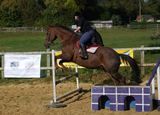 Country Rose
Country Rose

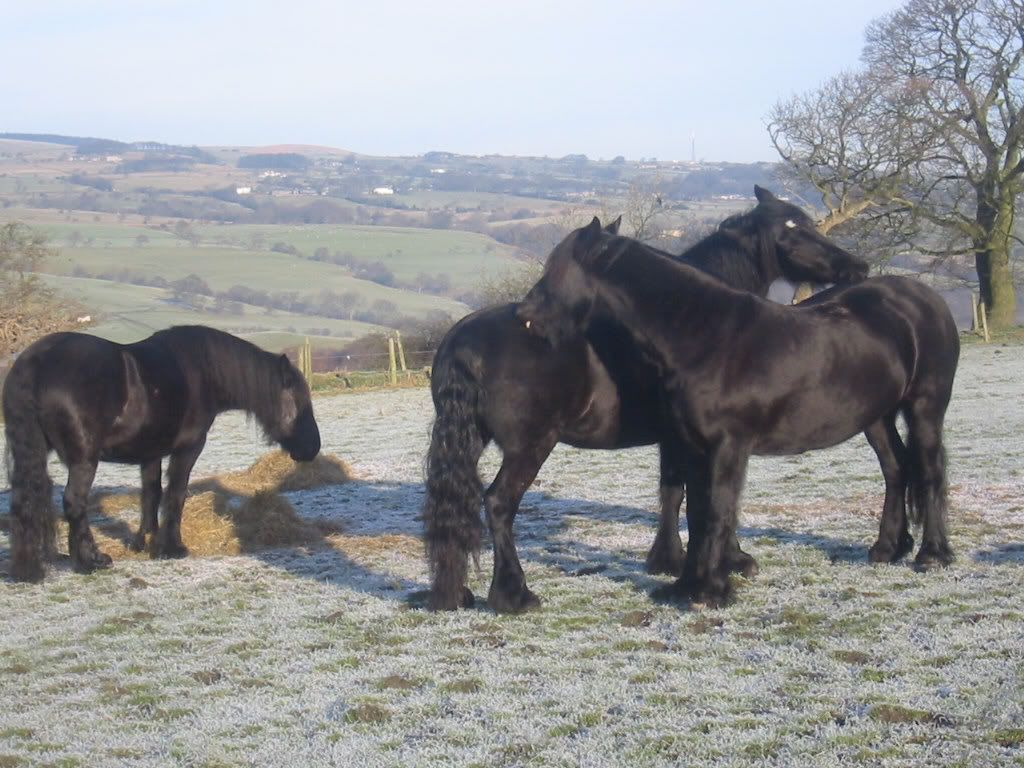




 It will kill a cat, just like onions do.
It will kill a cat, just like onions do. 